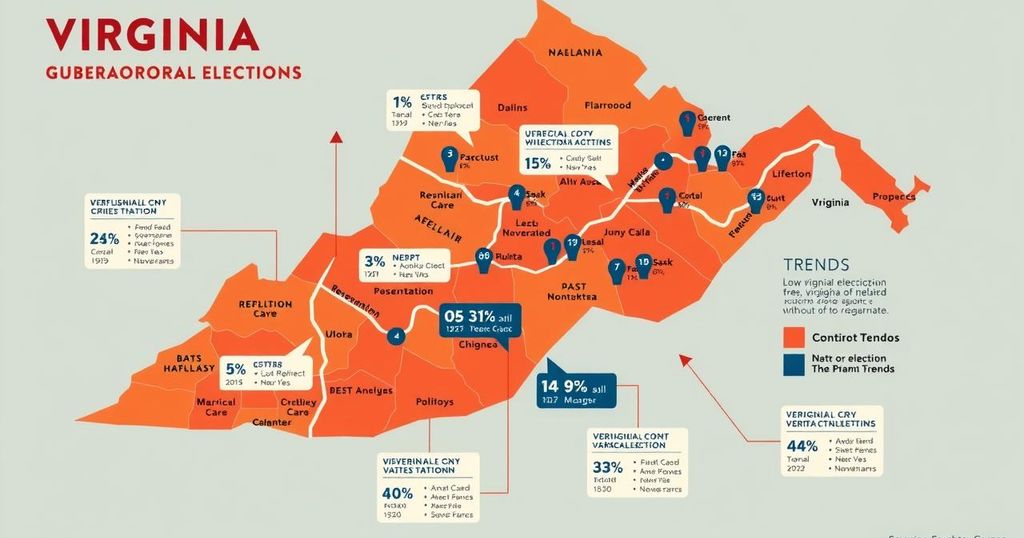World news
AFRICA, CHRIS CHRISTIE, COMMONWEALTH, DEMOCRATS, ELECTION, GEORGE H. W. BUSH, GLENN YOUNGKIN, LEGISLATION, MCAULIFFE, NEW JERSEY, PEW, PEW RESEARCH, POLL RESULTS, PRESIDENTIAL CANDIDATES, PRESIDENTIAL ELECTION 2024, SENATE, SOUTH AFRICA, TIM KAINE, U. S, U. S. SENATE, US ELECTIONS, VIRGINIA
Elena Martinez
0 Comments
Virginia’s 2025 Gubernatorial Election: A Crucial Political Indicator
Virginia’s 2025 gubernatorial election is critical because it highlights national political trends post-presidential elections. With its history of swinging toward opposition parties, and early polls indicating a Democratic lead, all eyes are on Virginia as the race unfolds. Given past election tightness, the outcome is uncertain and could impact future electoral strategies in 2026.
The significance of Virginia’s 2025 gubernatorial election cannot be overstated. As one of only two states casting votes for a governor that year—alongside New Jersey—Virginia becomes a focal point in national politics, drawing attention due to its potential to indicate the political leanings of the electorate in relation to the presidential administration.
Virginia stands apart from New Jersey as a bellwether for political shifts, especially given its recent voting history. While New Jersey has leaned heavily Democratic, not electing a Republican senator since 1972 and backing presidential Democrats since 1988, Virginia’s political landscape has been more dynamic. Once a stronghold for Republican candidates, Virginia has become increasingly Democratic since its vote for George W. Bush in 2004,
Since 2008, the state has consistently leaned left, with governments led by Democrats Mark Warner and Tim Kaine in the federal Senate since their respective elections. However, Virginia’s gubernatorial elections feature a notable peculiarity—governors are not permitted to run for consecutive terms. This rule has created patterns, particularly the historical tendency to elect governors from the opposite party of the sitting president.
Despite its recent trend toward Democratic leadership at the federal level, Virginia did elect Republican Glenn Youngkin in 2021. These nuances make the upcoming election significant: it raises questions about whether the state will lean Democratic again or continue its trend of opposition to federal authority. This may reflect the state’s viewpoint on former President Trump, who presently holds an approval rating of around 40%, according to Pew Research.
Polls suggest Democrats may have an advantage, with Abigail Spanberger leading in many areas. Past elections indicate caution, though. Both the 2013 and 2021 gubernatorial races were decided by slim margins, less than three percentage points, which suggests that poll numbers are only part of the story.
Polling volatility is illustrated by Democratic nominee Terry McAuliffe, who led substantially in 2013, yet his eventual victory was tighter than expected. In his follow-up attempt in 2021, he enjoyed a similar lead until the very last moments of the campaign when a surprising rightward shift occurred. These historical precedents underline that political tides can shift dramatically and unexpectedly.
Ultimately, the 2025 election is more than just a choice of candidate; it could be a bellwether for the strategies parties employ heading into the subsequent 2026 Senate and House elections. With primaries underway, the stakes are high for both Democrats and Republicans. Early voting is in progress for party primaries in Virginia, which can provide insights into how things might turn out. Those interested in obtaining more information on the process can refer to the Virginia Department of Elections website.
Virginia’s gubernatorial election in 2025 carries significant implications not only for the state but also potentially for national politics. The trends indicate a Democratic lean, influenced by prior voting patterns and current presidential approval ratings. However, historical volatility means that electoral outcomes could defy expectations. Both parties have a lot to consider moving forward, especially as momentum builds for the mid-term elections in 2026.
Original Source: www.wsls.com




Post Comment